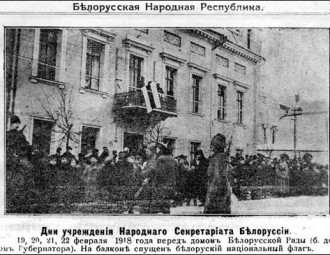Mikola Kupava: It is an illusion to believe that we see some kind of revival

Belarusians are encouraged to celebrate the centenary of the Belarusian People's Republic with dignity.
The idea of creating an independant Belarusian People's Republic was being actively developed in 1917 in Minsk. Already on February 21, 1918 the Executive Committee of the All-Belarusian Congress appealed to the people of Belarus with the first charters, which declared the Congress to be the main authority in Belarus. On March 9, 1918, the first grand meeting of the Executive Committee adopted the second charter: Belarus was proclaimed a People's Republic. The Executive Committee became the Rada of the Belarusian People’s Republic. Belarus was governed according to the principles od the freedom of speech, press, assembly, strikes, conscience, inviolability of the person and the home, the right to autonomy, equality of the languages of all ethnic groups. On the night of March 25, 1918, after ten hours of disputes Rada adopted the third charter, which proclaimed the independence of Belarus.
Although BPR existed for less than a year, according to Mikola Kupava, artist and the chairman of the organizing committee for the celebration of the 100th anniversary of the BPR, it was very successful.
"The main argument of those who deny the significance of BPR is that it was created under the German occupation. So what? - comments Mikola Kupava in his interview with the "EuroBelarus" Information Service. - On the contrary, the patriotic forces of Belarus managed to do create an independent state under the most difficult conditions."
In support of this notion he presents the following facts: BPR Consul in Odessa Stsiapan Nekrashevich opened 23 primary Belarusian schools and one grammar school. In the territory of Belarus back then the first school was opened in Vilnius in the 1915 and there were about a hundred of them by the end of the year.
When asked what lessons the Belarusians should learn from the history of the Belarusian People's Republic, the artist succinctly replies: "Just not to oversleep."
So now we need to celebrate the 100th anniversary of independence with dignity. The organizing committee is planning to hold its "rehearsal" this year. A week ago the Minsk City Executive Committee was sent a message stating the intention of people to lay flowers on Valadarskaja 9 on March 25. It is the building where the BPR Rada declared independence.
"We won’t request a permission for the laying of flowers as it looks wild and ridiculous," - emphasizes Mikola Kupava.
After it there will be "festivities" in the Adam Mickiewicz public garden. During the event it is planned to read the third charter of BPR, Ales Razanau, poet and Dzmitry Zaharevich, bard as well as others will perform, there will be singing and dancing. The organizers asked permission from the city authorities to hold this event, the answer is expected by March 20.
“The most important task now is to "legalize" the historic building, which hosted the Rada meeting since few people know about it,” - believes Mikola Kupava. According to the artist it should have a memorial tablet, as well as a Museum of the BPR. It is also planned to rent the premises of the Yanka Kupala Theater, to hold a meeting there just like 100 years ago. It will take place in any case, even if the permission is not granted, the organizers stated.
Besides that the organizing committee is going start the process of renaming the Valadarskaja street in honor of the brothers Anton and Ivan Lutskevich and hold a scientific and practical conference devoted to the anniversary.
"We should actively and boldly show our position and celebrate our holidays without waiting for better times. It is an illusion to believe that we see some kind of minor revival, "- concluded Mikola Kupava.
-
03.01
-
07.10
-
22.09
-
17.08
-
12.08
-
30.09



























